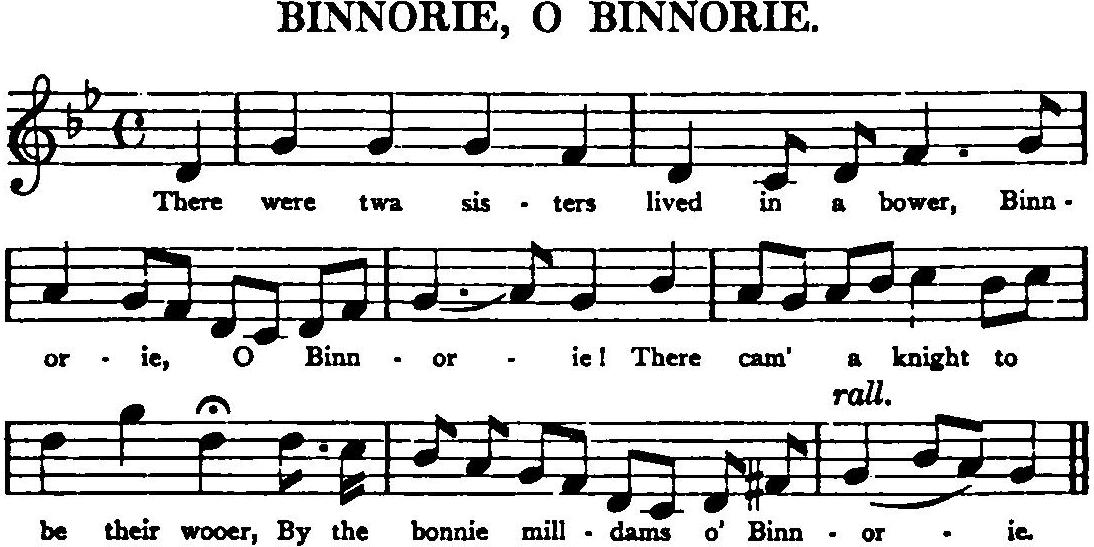Norham, Down By Norham- Lugton, 1830? Child 10- Version W
[I assume author and historian Mr. Thomas Lugton from Glasgow is the same "Mr. Thomas Lugton, of Kelso" who is the source of Child 10- Version W. If so Mr. Lugton also gave a version of the ballad to Robert Ford who published his air with a different text, in his book, Vagabond Songs and ballads of Scotland: Volume 2 in 1901. Ford's notes say:
"I am indebted to Mr. Thomas Lugton, Glasgow, who says it was noted by a friend of his own from the singing of a country person in the neighbourhood of Coldstream, Berwickshire, in or about the year 1830."
The comparison deserves further investigation. The similar date (1830) and the information from Ford are conjecture at this point without corroboration from a definitive source. Lugton's air is included below with Ford's notes.
A similar first stanza is found in Child J which appears in Notes and Queries, 4th S., v, 23. These lyrics were a response to an earlier query from Philadelphia (United States) about a song titled "Three Ladies Playing At Ball" (See: There Were Two Ladies Playing Ball- Child J) posted in an 1852 Notes and Queries. This opening stanza is also associated with Child No. 11, The Cruel Brother. Child No. 10 A also opens similarly (without the "at the ball").
According to Chapbook: Volumes 2-3 (Federation of Scottish Folk-Song Clubs, Aberdeen Folk-Song Club) The location of the mill dams o' Binorie has puzzled many collectors. One possible explanation is that Binorie is a corruption of "by Norham" as one of the earliest versions gives the village of Norham on the Tweed as the scene of the murder.
R. Matteson 2011, 2018]
NORHAM, DOWN BY NORHAM- Child 10; The Twa Sisters; Version W
Communicated by Mr. Thomas Lugton, of Kelso, as sung by an old cotter-woman fifty years ago; learned by her from her grandfather.
1 There were three ladies playing at the ba,
Norham, down by Norham
And there cam a knight to view them a'.
By the bonnie mill-dams o Norham
2 He courted the aldest wi diamonds and rings,
Norham, down by Norham
But he loved the youngest abune a' things.
By the bonnie mill-dams o Norham
* * * * *
3 'Oh sister, oh sister, lend me your hand,
Norham, down by Norham
And pull my poor body unto dry land.
By the bonnie mill-dams o' Norham
4 'Oh sister, oh sister, lend me your glove,
Norham, down by Norham
And you shall have my own true love!'
By the bonnie mill-dams o' Norham
5 Oot cam the miller's daughter upon Tweed,
Norham, down by Norham
To carry in water to bake her bread.
By the bonnie mill-dams o' Norham
6 'Oh father, oh father, there's a fish in your dam;
Norham, down by Norham
It either is a lady or a milk-white swan.'
By the bonnie mill-dams o Norham
7 Oot cam the miller's man upon Tweed,
Norham, down by Norham
And there he spied a lady lying dead.
By the bonnie mill-dams o Norham
8 He could not catch her by the waist,
Norham, down by Norham
For her silken stays they were tight laced.
By the bonnie mill-dams o Norham
9 But he did catch her by the hand,
Norham, down by Norham
And pulled her poor body unto dry land.
By the bonnie mill-dams o Norham
10 He took three taets o her bonnie yellow hair,
Norham, down by Norham
To make harp strings they were so rare.
By the bonnie mill-dams o Norham
11 The very first tune that the bonnie harp played
Norham, down by Norham
Was The aldest has cuisten the youngest away.
By the bonnie mill-dams o Norham
_____________________________
Excerpt from: Vagabond Songs and Ballads of Scotland: Second Series; Volume 2 edited by Robert Ford 1901
Few collections of Scottish ballads have appeared within the last two hundred years which do not embrace a copy of the above, in one or other of its many forms, and under one or other of its various titles of, "The Cruel Sister," "The Drowned Lady," "The Bonnie Bows o' London," "Sister, Dear Sister," "The Miller and the King's Daughter," or the one here chosen. And if the text and titles have varied so also have the refrains. Sometimes it has been printed with a deal of repetition, and this curious refrain :—
"There were twa sisters sat in a bour,
Edinborough, Edinborough;
There were twa sisters sat in a bour,
Stirling for aye,
There were twa sisters sat in a bour,
There cam' a knight to be their wooer,
Bonnie Saint Johnstoun stands upon Tay."
Other refrains have been "Hey ho, my Nanny O," and "While the swan swims bonnie O." Whilst on the borderland it has been found with "Norham, O Norham," and "By the bonnie mill-dams o' Norham." For the very excellent melody here printed, perhaps the original air, and which has certainly the real old ballad cry in it, I am indebted to Mr. Thomas Lugton, Glasgow, who says it was noted by a friend of his own from the singing of a country person in the neighbourhood of Coldstream, Berwickshire, in or about the year 1830.

[The text for Ford's air (from Lugton) is Sir Walter Scott's (Child C) text from 1802 with minor changes.]